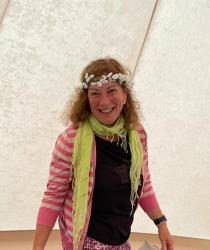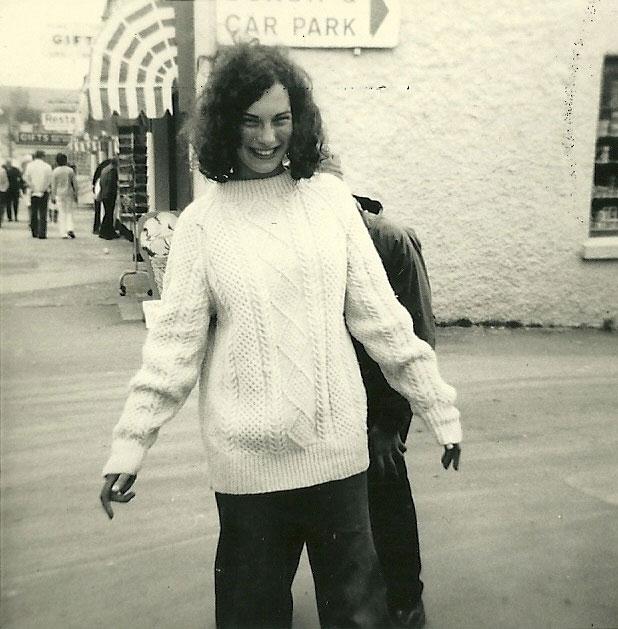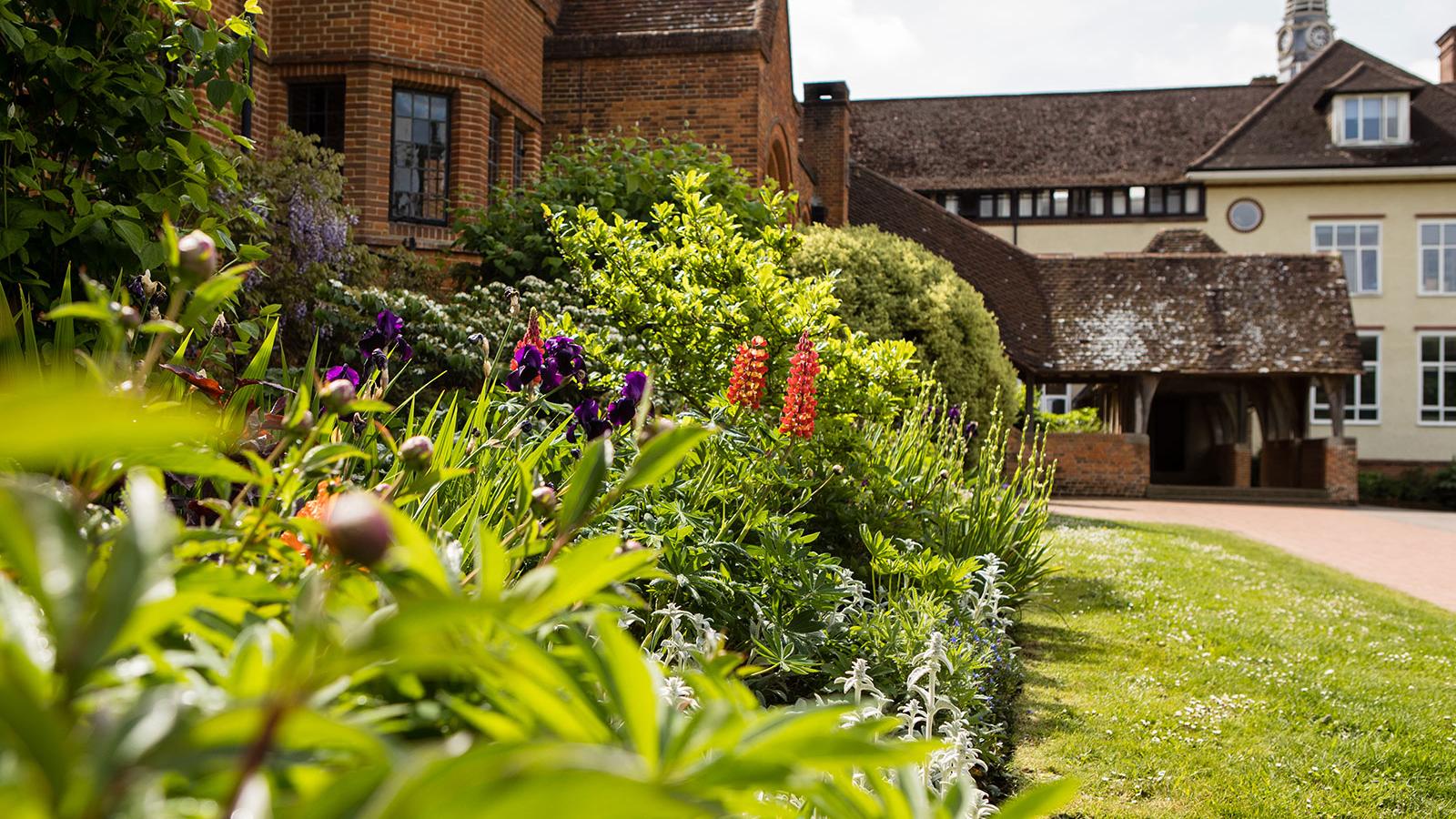
From her school days, Cathy Baxandall was always committed to “giving most things a go”. Here, she talks to us about how that philosophy was shaped at Bedales, along with her facility for the written word and a flair for languages, and how it led to a successful career in the law that has spanned almost four decades.
“My generation was one to which it seemed perfectly normal that boarding school should start at the age of seven or eight,” reflects Cathy Baxandall of her time at Dunhurst and Bedales. “My father was a northern grammar school lad who became a lecturer at Hull University and was very taken by the idea of progressive education. I think he looked at Summerhill and Dartington Hall before settling on Bedales (and, having much later read A.S. Neill’s book on Summerhill, I’m glad he chose as he did!). My mother, who was a science graduate, also believed that her daughters, as well as her son, deserved a stimulating all-round educational experience, and both my parents put family interests above their careers by moving to Hampshire in 1965 to be closer to Bedales.”
Cathy arrived at Dunhurst without a hint of homesickness and with just the one jarring note to record: “My parents, having invested a fortune (for them) in school uniform, dressed me up in it on my first day, while everyone else arrived in their casual clothes, so that marked me out as a “newbie” straight away. I remember waving goodbye quite happily as my parents’ car disappeared, and then wandering off to the boating pond in the Dunhurst orchard, where I saw two boys, newcomers like me, who had found an old door and were poling themselves across the water on it, regardless of how wet they were getting! That made an immediate and memorable first impression on me.”
The relative lack of academic structure at Dunhurst in the 1960s presented few problems for her. “I had always been a voracious reader in any case and I carried on that way,” she says. “My parents didn’t want me to take my 11+ exams, probably because they were worried that I might not pass them, but I sneaked into the exam room and did them regardless. Much to my Dad’s relief, I passed! I loved learning, and my only bad memories were linked to maths, which was never my subject, despite the best efforts of our (excellent) teacher at the time, Rosie Wood.”
When Cathy moved up into Bedales she continued to put her all-round interests and abilities to the test. “I hung out in the art room a lot but I also joined in with most of the stuff that went to make up the life of the school,” she says. “Unlike some of my peers, I may (with hindsight) have lacked the focus necessary to push myself to the highest level, but I still found it immensely fulfilling to be a part of everything. I sang in the choir, played piano and bassoon, got involved in lots of school drama, both on and backstage, and even played Olivia to Dan Day-Lewis’s Feste in Twelfth Night. Both he and “Fred” Simmons, who played Malvolio, had huge acting talent, and Dan had so much charisma and presence, it was a delight to be part of that production.”
I think Bedales creates an environment in which its students develop positive resilience, both mental and physical, which is enormously important. Having the confidence to “give things a go” has certainly been invaluable for me
The academic side of school life, however, arguably took pride of place in Cathy’s list of priorities. “Generally, I think that I was pretty happy in any company at school while always trying not to furnish anyone with material that might make me an object of mockery!” she observes. “Bedales could be a hierarchical place at times, certainly as far as talent was concerned, and I guess that I was part of a set that was reasonably popular because it was home to a lot of smart people. Academically, I think I ticked the right boxes and I worked hard as well.”

Central to Cathy’s academic world was the legendary figure of John Batstone. “He was, without doubt, a key person for me,” she agrees. “When I went from Dunhurst to Bedales, I was outraged that instead of simply enjoying reading and writing in English lessons, we had to read books we had not chosen and then pick them apart. In protest (at Cider with Rosie, if memory serves) I spent some lessons sitting on my table with my back to “Bat”: however, rather than fuelling the flames, he just ignored me until I got bored. The energy that radiated off “Bat” in English lessons (his recitation of The Millers’ Tale was particularly memorable) will stay with me forever, and although I did frequently get back essays almost destroyed by his red pen, I never felt his criticism was negative. Thanks to him, by the time I got to university my essay-writing ability put me well ahead of many of my first-year peers.”
John Batstone was by no means the only influence on Cathy. “My Dad, as an historian, was a bit disappointed that history wasn’t my favourite subject, but I think fondly back to an amazing group of teachers in a wide range of subjects,” she says. “Tim Williams, David Thompson and later David Simmons were such excellent foils for John as English teachers. The partnership of lovely Richard Stokes and terrifying George Bird for German, who took us to Lieder concerts; Catherine Dryer, such a gentle and sympathetic soul, who used to give us primary school charts with gold stars in French and helped me forge the link that took me to St Anne’s College, Oxford. Then there was William Agnew, an amiable slave-driver and a fantastic choir-master, David Butcher and his wonderful workshop and all those people who taught us how to drive tractors!”
Unfazed by the prospect of going up to Oxford to study Modern Languages, Cathy was initially somewhat perplexed by what she found there. “I had got used to having both male and female friendships, whereas attitudes to inter-gender relationships in the first year at Oxford were generally incredibly immature,” she notes. “Some of my fellow students responded to their new surroundings by either diving into the Christian Union or becoming quite promiscuous. It took time to find my crowd, but once I did, I enjoyed myself immensely, made some good friends, especially through rowing, and extended my extracurricular activities to include college drama, writing for “Cherwell”, singing in a choir and attending the odd Union debate, without being either particularly good or particularly bad at any of them.”
Thanks to John Batstone, by the time I got to university my essay-writing ability put me well ahead of many of my first-year peers
Having gained a First Class degree in Modern Languages, Cathy made the “very rational” decision to forge a career in the law. “The trust fund that had put us through Bedales had run out and my parents, as a lecturer and a teacher, were struggling to pay fees for my younger sister,” she explains. “As a linguist I spent my third year abroad, so by my fourth and final year, a lot of my contemporaries had already left Oxford. I had spent time coaching a St Anne’s college novice lawyers’ rowing eight in my second year, and they were great fun, so I naturally gravitated back into their company. It was a bit of a light-bulb moment – they were off to bar school or law college, and I realised that if I converted to law, it would allow me to continue studying and then help me get into the world of work. I’d already discovered my ability to study well, pass exams and manipulate language so it all made sense. I applied for a grant to do the law conversion course, was successful and went on to the College of Law – although the rigidity of the concentrated two-year course was a bit of a shock, and I hated it for the first year!”
Life as a lawyer would quickly improve for Cathy. Her law exams successfully negotiated, she spent time as a stagiaire at the European Commission before starting her training with one of London’s leading law firms, Clifford-Turner. “By luck, my first six months of training were spent in the Brussels office before I headed back to London to finish my articles,” Cathy recalls. “What I really wanted, however, was to be able to go back to France to work there. When I qualified, an opportunity opened up in the Paris office, as long as I was prepared to work in their banking team. So that’s what happened – I went to Paris in 1986, stayed a couple of years and meanwhile the firm merged and became Clifford Chance.”
Originally, the intention had been for the recently married Cathy to be joined in Paris by her husband. “That never materialised, so we commuted cross-channel at weekends, which wasn’t sustainable, and after two years I was ready to come back to England. 18 months later, he moved jobs to Halifax in West Yorkshire,” she relates. “By now I was pregnant but I fully intended to continue working as a lawyer, so applied to various firms up in the north - some of the reactions to an evidently expectant mother candidate were rather old-fashioned! In those days, support for working mothers in the legal profession was relatively novel in the City and practically non-existent in the regions. I tried to do my bit to change that by chairing the women’s solicitors group in Leeds, and helping to put together maternity packages at my firm and others. Things have improved with changes in the law, but I remain horrified at the feeble pace of progress towards gender equality that persists today, not only in law firms but also in so many other professional services organisations.”
Undaunted by the dinosaurs, Cathy became an associate and then partner at Simpson Curtis in Leeds, which subsequently merged and is now part of national firm Pinsent Masons. In the mid-90s a client offered her a position in-house, and with two small children at this point she didn’t hesitate to make the move. She has since enjoyed a career of more or less uninterrupted success over some 35 years in both private practice and the in-house legal world as General Counsel and Company Secretary of various listed companies including Marshalls, Silentnight and Thistle Hotels.
“It’s a great life if you’re interested in being part of a team, getting things done, and I have found it remarkably satisfying despite the culture of long hours that still exists and the occasional misogyny,” she says. “Moving from private practice was fascinating – a fair analogy might be a surgeon deciding to become a GP – and over the years I have dealt with everything from single consumer complaints to billion-pound transactions so I can’t grumble about the variety. Law may not fill the soul, but it has definitely met my requirement for continuous intellectual challenge – and I have also enjoyed being able to work in manufacturing businesses that still create products that you can see and touch.”
In some ways, Cathy still speaks like the Bedales student she once was. “Oh, I’ve changed in some ways and not only because I’m a Southerner from a family who were all born in the North of England and now I’m the only one living in the North,” she says. “My younger self was quite ambitious and might have expected me to have achieved a higher profile by now! I’m much more pragmatic today, and have realised that I can make a difference without always feeling the need to reach for the stars. I’m a Trustee of the Open College of the Arts and Ilkley Literature Festival (and also Chair of the Bedales Grants Trust Fund), I sing with the local choral society, I live in the most beautiful countryside and I still enjoy a good bop! I’m really aware of my debt to Bedales, which has made all the difference in the world to me as a person. Of all my friendships, the ones that I made at Bedales have been much the most enduring, and I’m still in close touch with many of my year group. You asked me to sum up Bedales in a word – I chose “resilience”.
Cathy Baxandall was interviewed by James Fairweather in Summer 2022.
